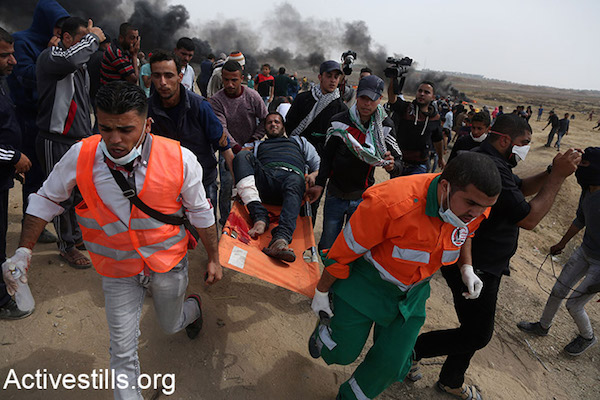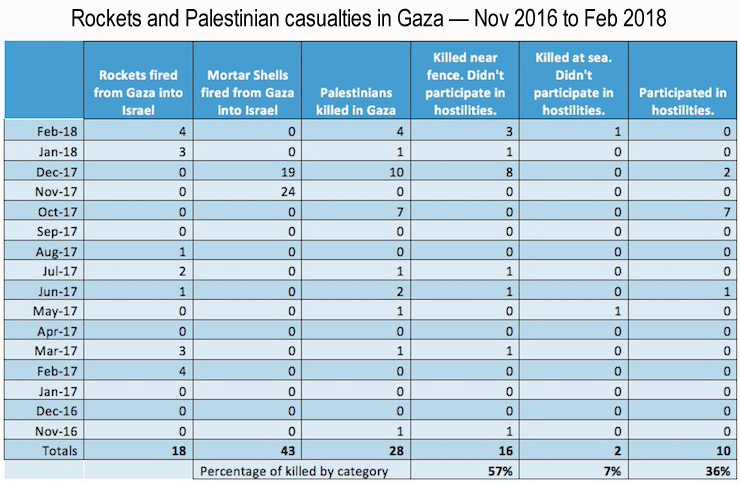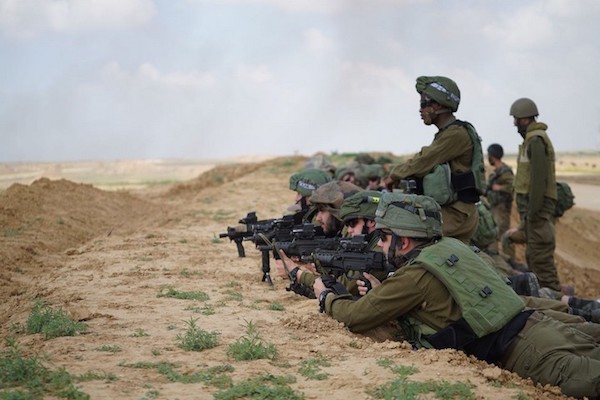Not a single rocket has been fired into Israel from Gaza in over two months, yet since March 30 Israel has killed more Palestinians in Gaza than it did in the previous 16 months, during which time militants launched over 60 rockets and mortars.

The Israeli army’s response to unarmed protests in the Gaza Strip over the last few weeks has been vastly deadlier than its response to rockets fired from the besieged territory over the past year and a half.
Israeli military forces have killed more unarmed Palestinians participating in the Great Return March protests in Gaza since March 30, during which time no rockets or mortars were fired into Israel, than it did in the preceding 16 months during which time Palestinian groups fired dozens of projectiles into Israel.
In fact, not a single rocket has been fired into Israel from Gaza since February 18, according to the IDF Spokesperson.
At least 40 unarmed Palestinians — including two journalists — have been shot and killed by Israeli sharpshooters and snipers in the vicinity of the Gaza border fence since March 30. At least 1,500 others were wounded by sniper gunfire, according to the United Nations data from earlier this week.
From November 2016 through February 2018, according to B’Tselem data, the Israeli military killed 28 Palestinians, only 36 percent of whom were participating in hostilities.

In fact, 57 percent of the Palestinians killed by Israeli troops in that 16-month period were unarmed and were shot in the vicinity of the border fence, either while participating in protests or trying to cross into Israel to find work, according to B’Tselem’s research. Another 7 percent were killed by Israeli naval forces while at sea.
There does not appear to be any correlation between periods when greater or fewer rockets and mortars were fired by Palestinian groups into Israel and the number of Palestinians killed by Israeli forces. Furthermore, only two of the Palestinian casualties, or 7 percent of all of the Palestinians killed between November 2016 and February 2018, were targeted in retaliation for firing rockets or mortars into Israel.

If we include the data of protesters killed during the Great Return March and a farmer killed near the border fence in early March 2018, it becomes even clearer that it is far deadlier to be an unarmed civilian in the vicinity of the Gaza border fence than an armed militant firing rockets and mortars into Israeli territory.
Including those killed during the Great Return March, 82 percent of the Palestinians killed by Israel in the Gaza Strip over the past year and a half were noncombatants participating in unarmed protests, farming their land, or attempting to cross the border to find work. Only 15 percent were participating in hostilities, of whom only two percent can be tied to rocket or mortar fire.
No Israeli civilians or security forces have been wounded or killed as a result of the Great Return March protests, including as a result of the one or two attempts by militant groups to exploit them as cover for armed attacks.
It’s hard to say what the conclusion is from the data beyond the obvious — that in the past year and a half it has been a far deadlier endeavor to protest Israel’s siege without resorting to armed violence than it is using rockets.
Another conclusion might be that Israeli decision-makers, whether in the political or military echelon, see no negative consequences for shooting unarmed protesters that might deter them from continuing to deploy snipers along the borders week after week. Engaging Gaza’s militant groups with deadly force in response to rocket fire, on the other hand, runs the risk of escalating into full-fledged armed conflict that would bring with it far greater consequences for Israel militarily, diplomatically, and geopolitically.

